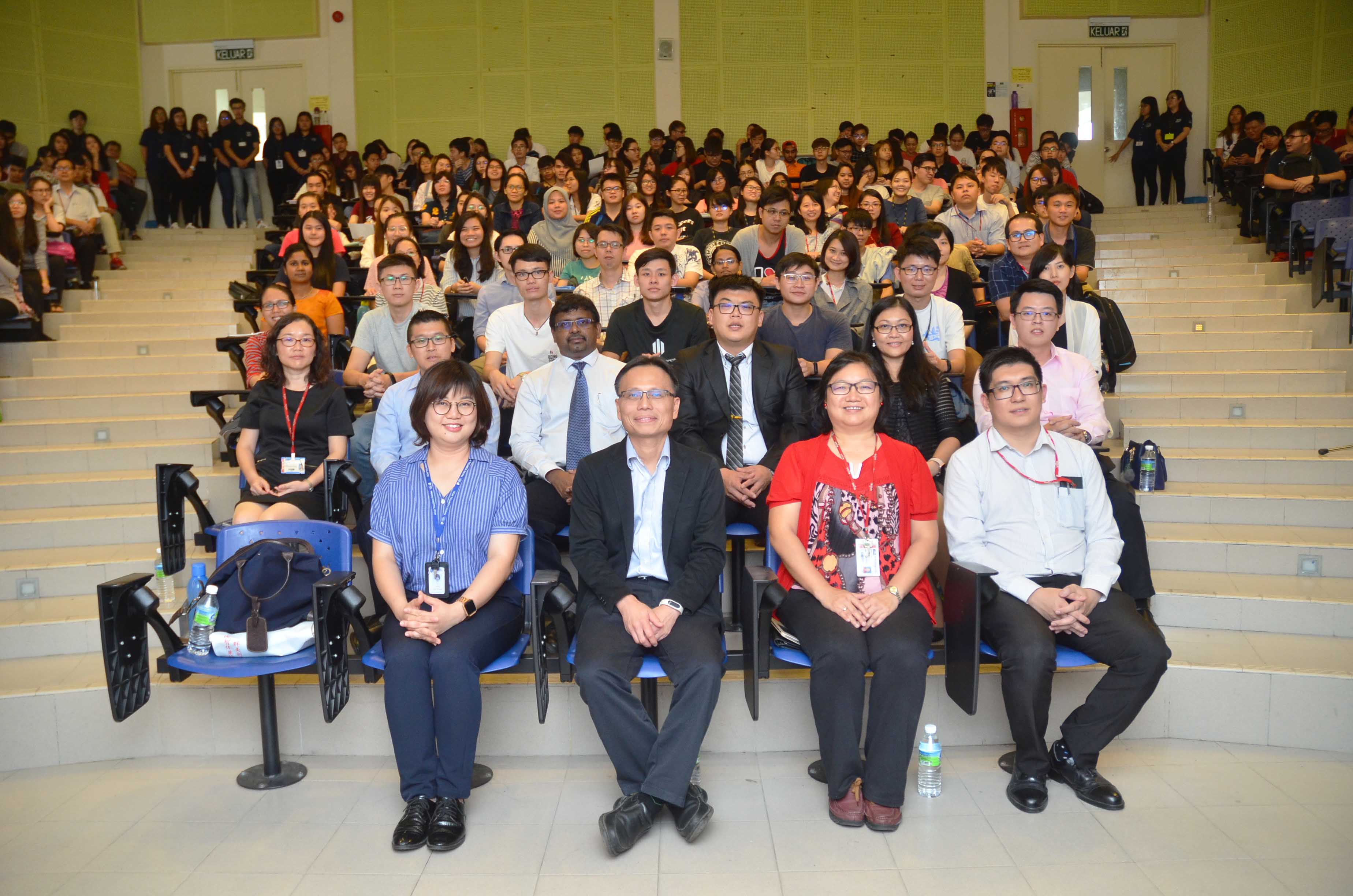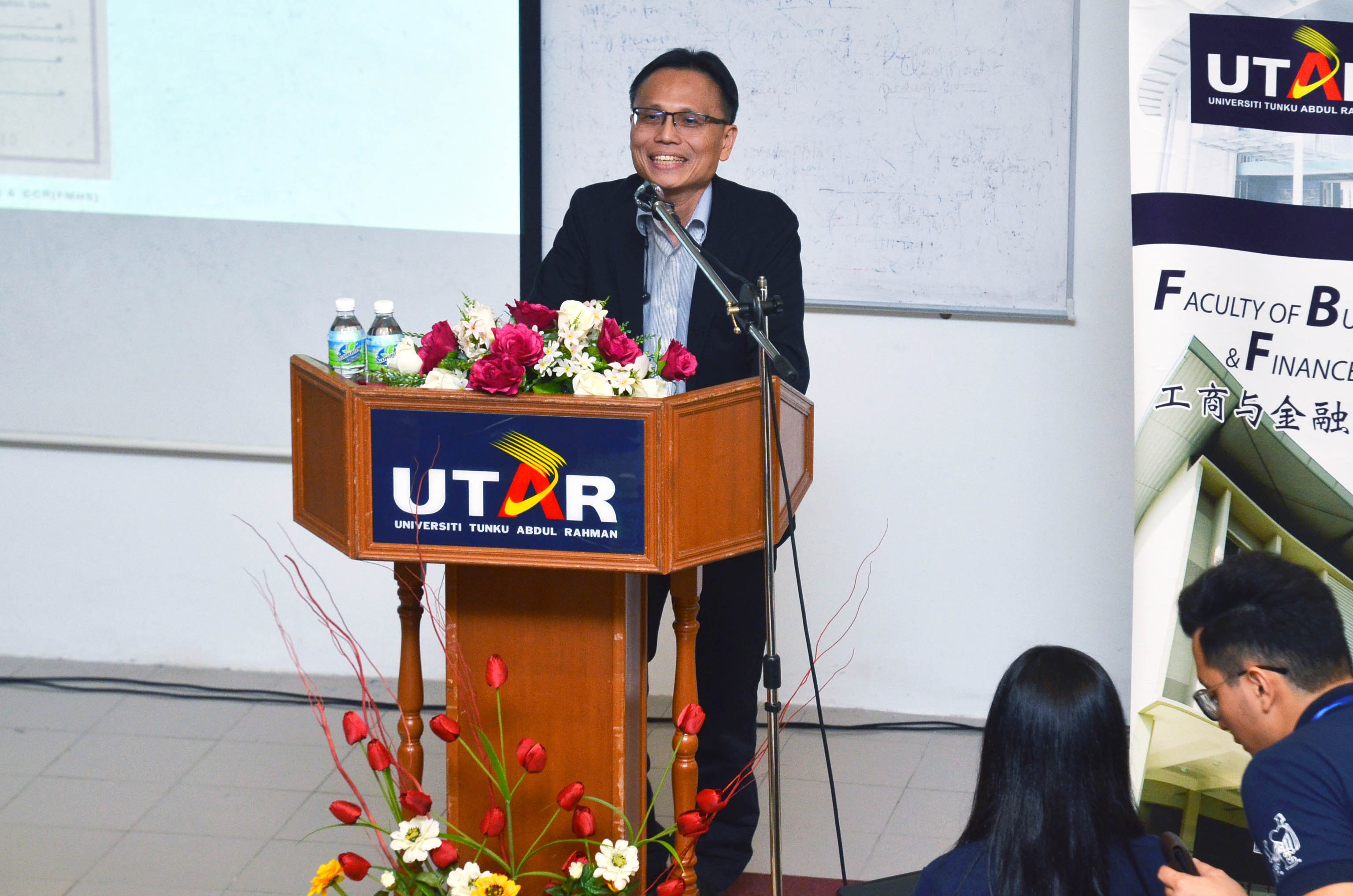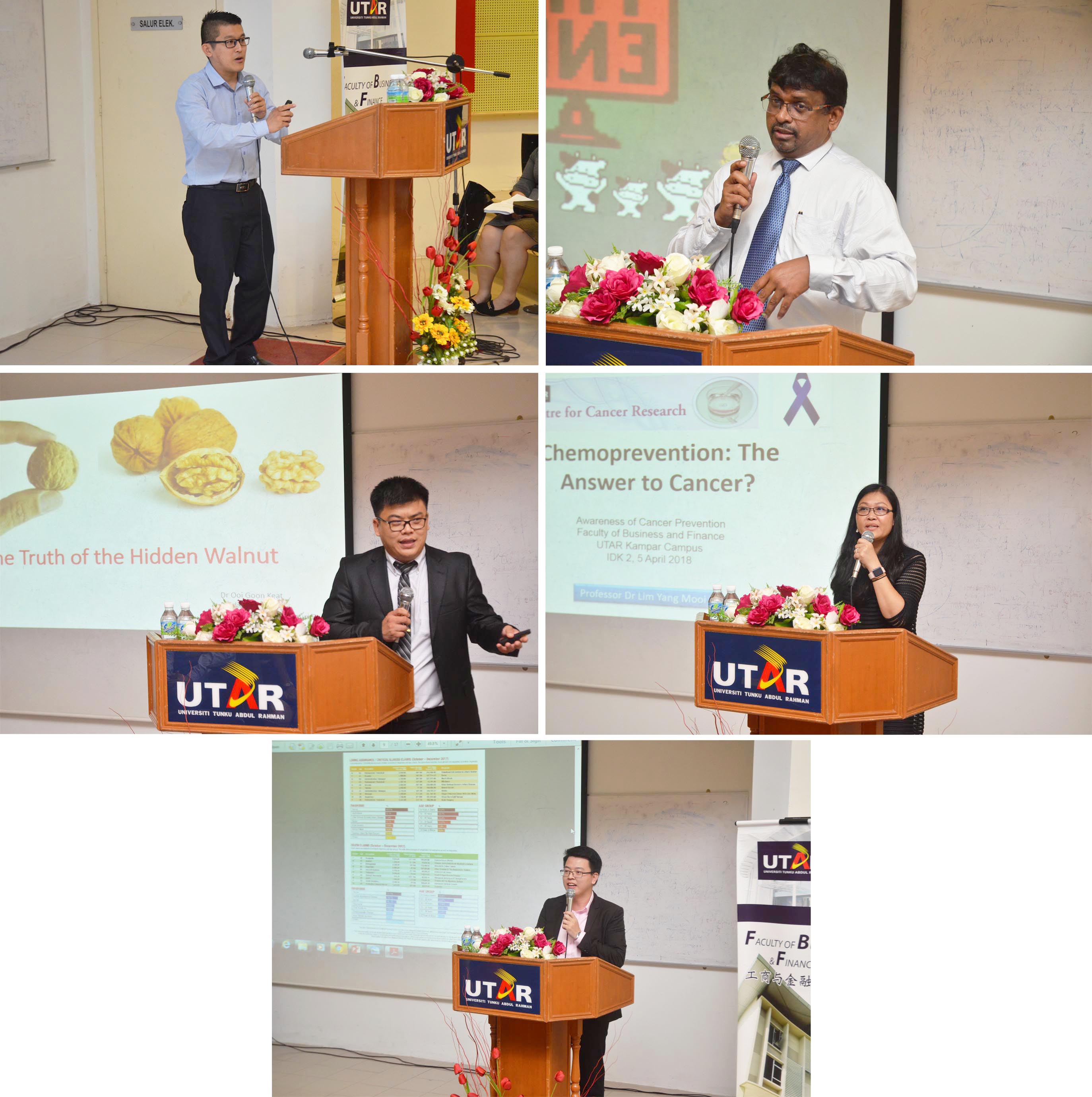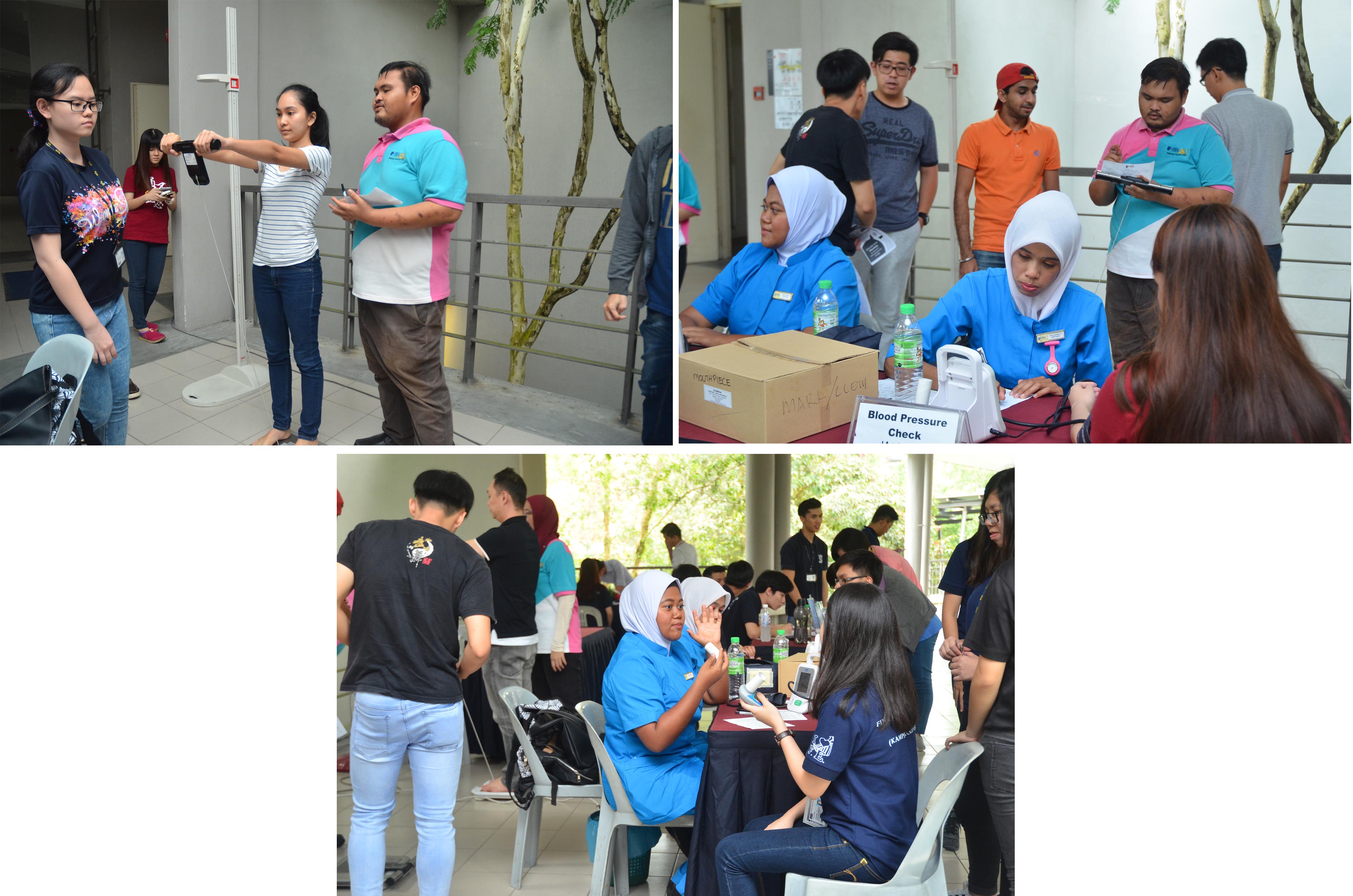

Front row, from left: Liang, Prof Lee, Dr Au Yong and Foo with speakers and participants
“There is no one in this world who does not know about the fatal disease called cancer. It is one of such diseases that spreads faster than anything in this universe. Cancer is a disease that takes the life away from the patient even before his death. We get terrified if we even hear about someone affected by cancer. The doctors and medical officers across the globe work round the clock to invent medicines for cancer. They are getting successful, but still unable to find one such medicine that prevents the disease completely,” said UTAR Vice President for R&D and Commercialisation Prof Ir Dr Lee Sze Wei at the opening ceremony of “Awareness of Cancer Prevention Seminar” held at UTAR Kampar Campus on 05 April 2018.

Prof Lee thanking the speakers
Jointly organised by UTAR’s Centre for Economic Studies, Centre for Cancer Research and Financial Economics Society, in collaboration with Pantai Hospital Ipoh, the one-day cancer awareness campaign aimed to educate the young generations on the different types of cancer, the symptoms, the clinical analysis as well as the necessary instrumental test for cancer.
Themed ‘Awareness of Cancer Prevention: Coping with it medically and financially’, the seminar also aimed to create awareness on the importance of medical checkup and financial planning on medical expenses.
Also present at the opening ceremony were UTAR Faculty of Business and Finance (FBF) Dean Dr Au Yong Hui Nee, Representative of Pantai Hospital of Ipoh Danielle Liang Shi Yuan, Organising Chairperson of the Awareness of Cancer Prevention Seminar-cum-Chairperson of Centre for Economic Studies Foo Chuan Chew, UTAR staff and students. The seminar also saw a series of talks delivered by five invited speakers, namely Nephrologist Dr Pang Hoong Chee from Pantai Hospital Ipoh, Orthopaedic Surgeon Dr N. Supparamaniam from Pantai Hospital Ipoh, Medical Officer Dr Ooi Goon Keat from Hospital Raja Permaisuri Bainun Ipoh, UTAR Faculty of Medicine and Health Sciences Prof Dr Lim Yang Mooi and Financial Planner Tan Chee Guan from Genesis Marketing.
Prof Lee added, “The perception of most common people on the mention of cancer is that it is a lethal and terminal disease. Yet, a few would be aware of the sufferings and anguish of cancer patients and their loved ones. According to the statistics, the prevalence of cancer in its various types is on the rise in the Malaysian society and the chances of getting the disease increase with age. Therefore, today’s event is indeed very appropriate and timely to bring awareness to the public of the severity of this disease and its consequences and most importantly how to prevent getting the disease and prior information on how to handle the situation in the unfortunate event of being afflicted by the malady.”
Liang in her speech thanked UTAR and the organising committee to give Pantai Hospital an opportunity to be part of this awareness seminar. She added, “I hope the talks will educate the young participants on how to reduce the risk of getting cancer.”

Liang introducing Pantai Hospital Ipoh
The first to enlighten the participants with diagnosis and treatment of kidney diseases was Dr Pang, with his talk titled “Wash your clothes, not your kidneys”. In his talk, Dr Pang explained that a kidney disease can be attributed to a variety of causes including genetics, injuries and medicines, unlimited intake of alcohol, overload of toxins from heavy metals, diabetes and hypertension. He said, “Chronic kidney disease is a long-term condition where the kidneys don’t work as well as they should. It’s a common condition often associated with getting older. Kidney diseases often have no symptoms, it can go unnoticed until it is very advanced. Most kidney diseases attack the nephrons. This damage may leave kidneys unable to remove wastes. Among the causes of kidney disease include genetic problems, injuries or medicines. One has a higher risk of kidney disease if he or she has diabetes, high blood pressure, or close family member with kidney disease.” He concluded, “Taking steps to live a healthy lifestyle can go a long way towards reducing risk and early detection and treatment can slow or prevent the progression of kidney disease.”

Clockwise from top left: Dr Phang, Dr Supparamaniam, Prof Lim, Dr Ooi and Tan delivering their talks
Dr Supparamaniam’s session elucidated to the participants on orthopaedic cancer, an abnormal growth of cells, within the bone and muscle. In his talk titled “How to detect and manage a primary bone tumour?”, Dr Supparamaniam explained, “Primary bone tumour refers to a neoplastic abnormal growth of tissue in bone. It can be either benign or malignant. Most orthopaedic cancers begin as benign (non-cancerous) or malignant (cancerous) tumours, abnormal growths of cells, within the bone and muscle. Benign orthopaedic tumours are more common and are rarely life-threatening.” He added, “When a bone tumour is cancerous, it is either a primary bone cancer or a secondary bone cancer. A primary bone cancer actually begins in bone—while the secondary bone cancer begins somewhere else in the body and then metastasises or spreads to bone. Secondary bone cancer is also called metastatic bone disease.” The talk also focused on the symptoms, accurate diagnosis of a bone cancer as well as its main treatments.
Dr Ooi on his “The truth of hidden walnut” talk provided participants with the knowledge about the prostate cancer. He described, “Prostate cancer is cancer that occurs in the prostate gland, a small, walnut-shaped organ that lies just below a man’s bladder. The prostate gland surrounds the urethra, the tube that carries urine from the bladder out of the body through the penis and it produces most of the fluid in semen. Prostate cancer is one of the most common types of cancer in men. Usually, prostate cancer grows slowly and is initially confined to the prostate gland, where it may not cause serious harm and has a better chance of successful treatment.” He added, “If you have a first-degree male relative with prostate cancer, you have a higher chance of developing it than men with no such history. The risk increases again if more than one male relative has prostate cancer. Risks are also higher for men whose male relatives were diagnosed when young.” His talk also touched on the aspects of symptoms, dietary, early detection and treatment options.
On the other hand, Prof Lim enlightened the participants about cancer and the cell cycle. In her talk, titled “Chemoprevention: The Answer to Cancer?”, she explained, “In normal cells, the cell cycle is controlled by a complex series of signaling pathways by which a cell grows, replicates its DNA and divides. This process also includes mechanisms to ensure errors are corrected, and if not, the cells commit suicide (apoptosis). In cancer, as a result of genetic mutations, this regulatory process malfunctions, resulting in uncontrolled cell proliferation. Cancer is a disease of cell biology. In cancer cell, accumulation of defective DNAs leads to uncontrollable and inappropriate proliferation.” Prof Lim also focused on the cancer statistics in Malaysia, tumour metastasis, cancer causing factors, current challenges in cancer treatment, hallmarks of cancer, carcinogenesis and cancer chemoprevention, best strategy to reduce cancer, prevention and healthy lifestyle, ethno medicinal approach and cancer treatment in the future and the use of traditional Chinese herbs in curing cancer. She also emphasised on the methods of preventing cancer by eating cancer-fighting foods and following this other lifestyle tips that can lower cancer risk.
Last but not least, Tan educated the participants on how to manage the finances during cancer treatment. Tan said, “Many people who are diagnosed with cancer worry how they will manage the financial impact of cancer. There are many different types of costs that could add up during treatment and recovery. Apart from the main cost, cancer patients may have health-related expenses such as medication, equipment and specialist fees. Therefore, it’s always good for an individual to own a strong financial and medical plan to reduce the financial burden at the later stage.” He encouraged the participants to protect themselves with a good financial and medical insurance plan in order to avoid greater financial impact.

Participants listening attentively to speakers
Apart from the insightful talks, the organiser also held a mini health screening session for all the participants. The participants were eligible for a free body check-up prior to the seminars. The seminar saw a participation of more than 200 participants including UTAR students and staff. Each talk session ended with an interactive Q&A session from members of the audience.

Participants getting free health screening test
© 2019 UNIVERSITI TUNKU ABDUL RAHMAN DU012(A).
Wholly owned by UTAR Education Foundation Co. No. 578227-M LEGAL STATEMENT TERM OF USAGE PRIVACY NOTICE